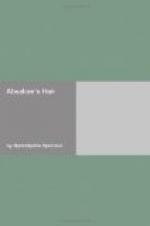As soon as his mother had felt sure that Angelika was not really enceinte she had busied herself in collecting all the information about her which it was possible to obtain.
By the untiring efforts of her ubiquitous relations she had succeeded to such an extent and in such detail as no examining magistrate could have accomplished. And there now lay before him letters, explanations, evidence, which the deponent was ready to swear to, besides letters from Angelika herself: imprudent letters which this impulsive creature could perpetrate in the midst of her schemes; or deeply calculated letters, which directly contradicted others which had been written at a different period, based on different calculations. These documents were only the accompaniment of a clear summing-up by his mother. It was therefore she who had guided the investigations of the others and made a digest of their discoveries. With mathematical precision was here laid down both what was certain and what, though not certain, was probable. No comment was added, not a word addressed to himself.
That portion of the disclosures which related to Angelika’s past does not concern us. That which had reference to her relations with Rafael began by proving that the anonymous letters, which had been the means of preventing his engagement with Helene, had been written by Angelika. This revelation and that which preceded it, give an idea of the overwhelming humiliation under which Rafael now suffered. What was he that he could be duped and mastered like a captured animal; that what was best and what was worst in him could lead him so far astray? Like a weak fool he was swept along; he had neither seen nor heard nor thought before he was dragged away from everything that was his or that was dear to him.
As he sat there, the perspiration poured from him as it had done the night before, and again he felt a deadly chill. He therefore went up to his room with the papers, which he locked up in his trunk, and then set off at a run along the road. The passers-by turned to stare after the tall fellow.
As he ran he repeated to himself, “Who are you, my lad? who are you?” Then he asked the hills the same question, and then the trees as well. He even asked the fog, which was now rolling off, “Who am I? can you answer me that?”
The close-cropped half-withered turf mocked him—the cleared potato patches, the bare fields, the fallen leaves.
“That which you are you will never be; that which you can you will never do; that which you ought to become you will never attain to! As you, so your mother before you. She turned aside—and your father too—into absolute folly; perhaps their fathers before them! This is a branch of a great family who never attained to what they were intended for.”




